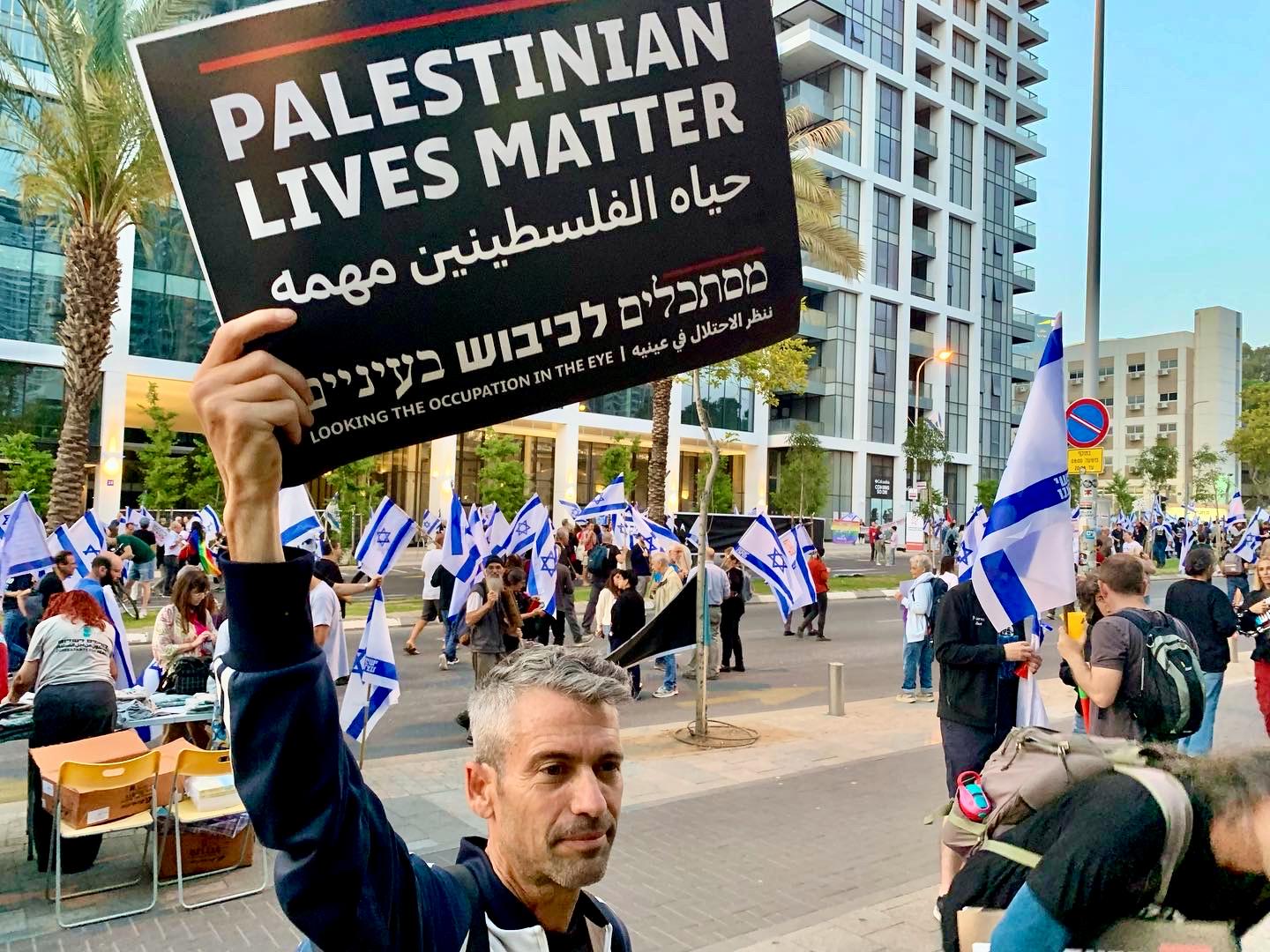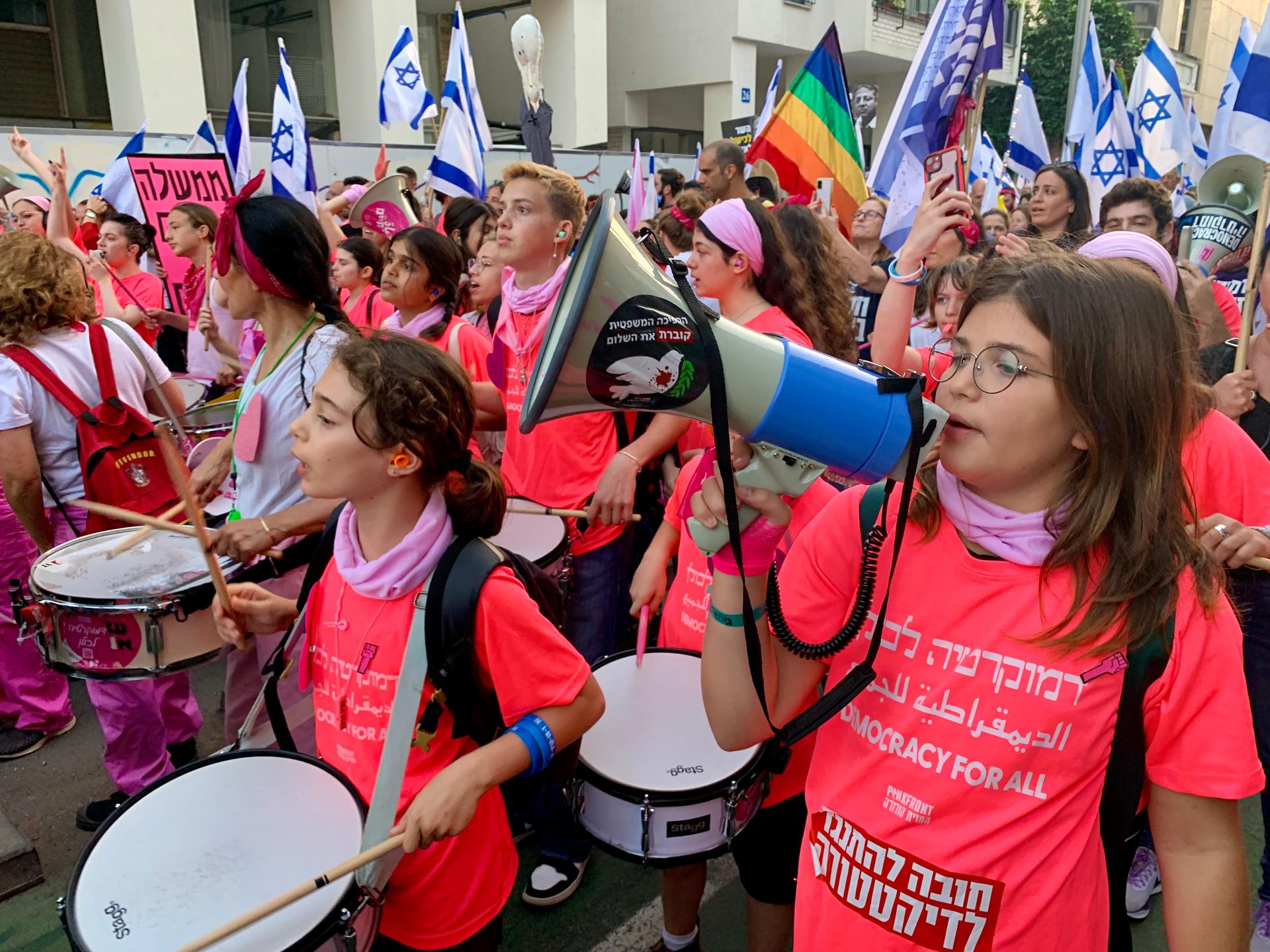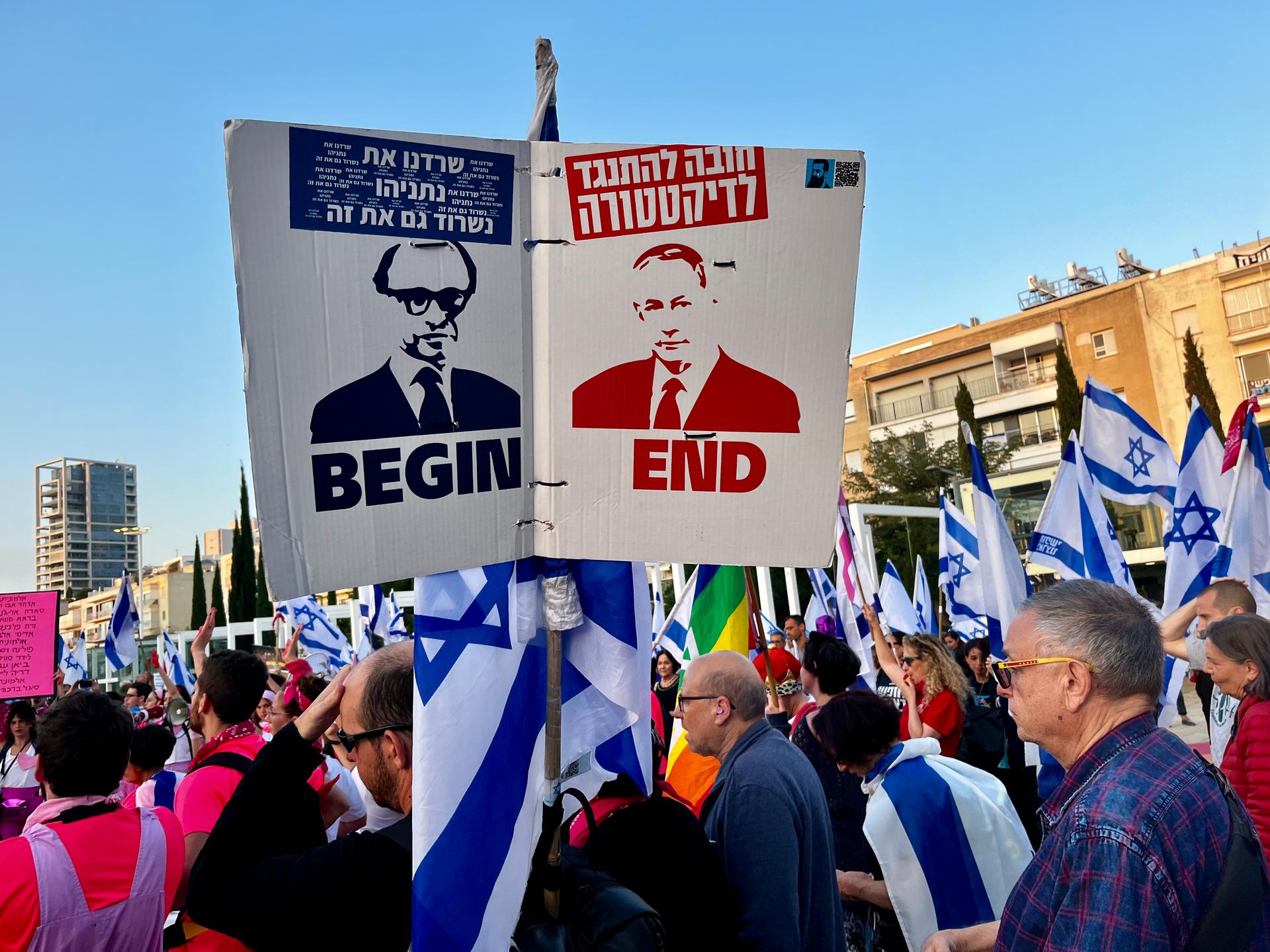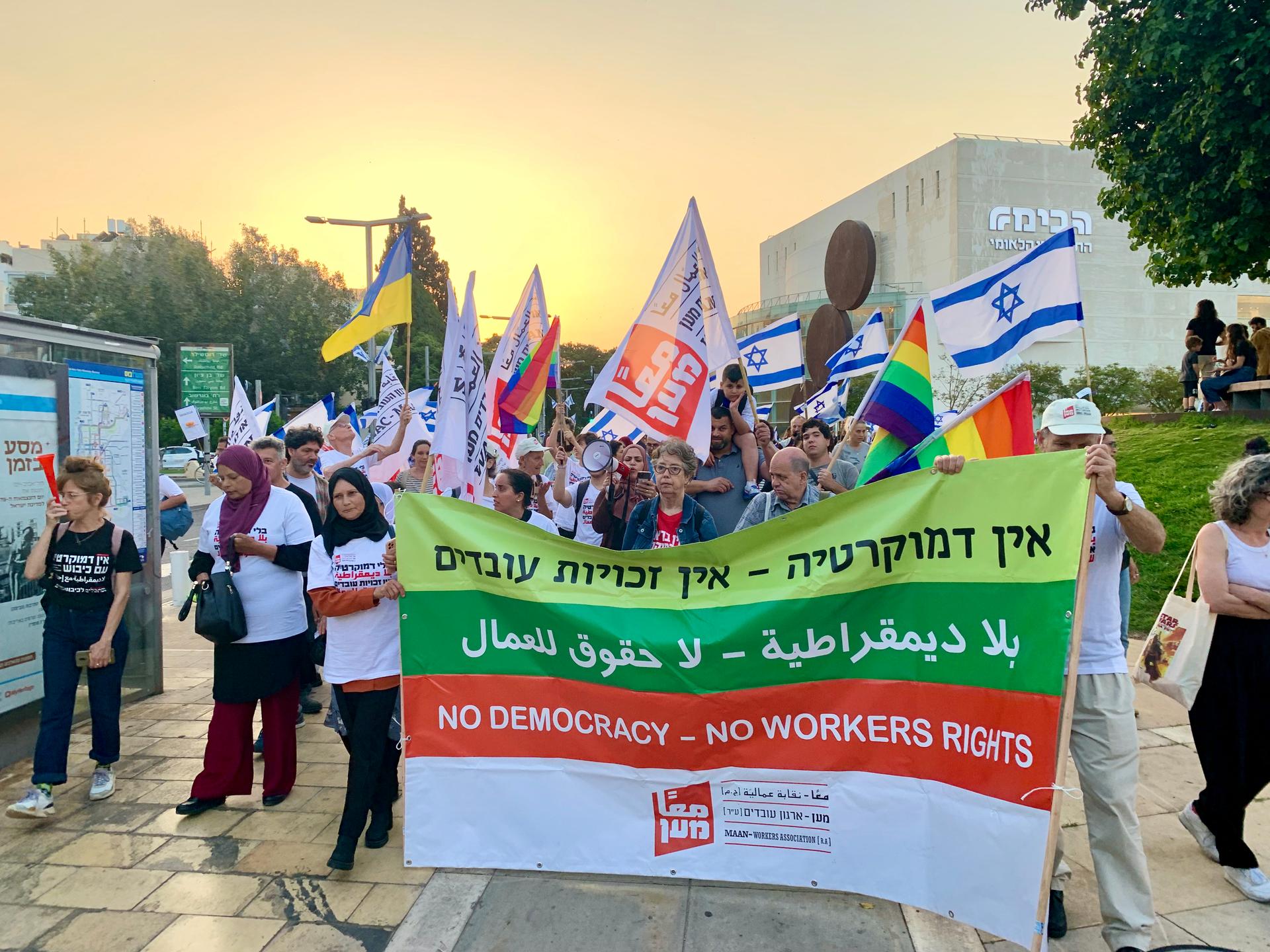Israel’s ‘judicial coup’ protests are going strong. They still might fail.
After the sun goes down on Saturday evening, Shabbat, the Jewish day of rest, comes to an end — and the streets of central Tel Aviv, Israel, fill up with people.
“Democracy,” they chant in Hebrew, emphasizing each syllable.
Week after week, tens of thousands of Israelis have been showing up for anti-government protests across the country. The biggest crowds gather every Saturday night in central Tel Aviv. More recently, there were concerns among protest supporters that the movement might be starting to lose steam. But they did it again over the weekend, for the 18th consecutive week.
Israel’s Channel 12 estimated that more than 100,000 people came out to protest Israel’s far-right government and its plan to overhaul the country’s judicial system, which would hand the Legislature broad powers over the courts.
Demonstrators in Tel Aviv are highlighting a whole range of issues that they now see as under threat by this far-right government.
One group was waving an enormous rainbow flag while another was calling for workers’ rights.
Ido Dror, a 42-year-old Jewish Israeli teacher from Jaffa, a mixed Jewish and Arab part of Tel Aviv, held up a sign that read: “Palestinian lives matter. Democracy and occupation cannot coexist.”
Israel’s military occupation in the West Bank, he said, is a core issue for this protest movement.

“We are controlling other people with [our] military,” Dror said. “They don’t have the same rights as I have. So, it’s not a democracy [for Palestinians].”
It’s all connected, Dror said.
“The [judicial] reform is just another tool to get more power.”
Hagit Carmel, 52, who works in the department of gender and women’s studies at Tel Aviv University, said that she’s been coming here almost every Saturday for four months.
“It’s very important to see everybody protesting for one thing: don’t hurt our democracy,” said Carmel, whose T-shirt read: “No democracy, no academic freedom.”
She said that she’ll keep coming out for these protests for as long as it takes: “I mean, my Saturday nights are already fixed now. I’m not doing anything else instead of that.”
Other groups represented at the protest are Israel’s high-tech sector. Business leaders say this government’s hard-right policies are jeopardizing the economy.
And military veterans are here, too, including one group who served in the 1973 Yom Kippur War.
But some key political groups are hardly present at all, like members of the Ultra-Orthodox population, which is represented in the government led by Prime Minister Benjamin Netanyahu.
Also, Palestinian citizens of Israel — who make up 20% of the electorate — have largely stayed away.

Next to the seaside in Jaffa, a group of young Arab men relaxed on the boardwalk. They said that they won’t be going to these weekly protests, even though they want the demonstrations to succeed.
Marcel Spiliopolous, 19, who describes himself as an Arab Christian, grew up here in Tel Aviv and recently graduated from high school. He said that he feels somewhat conflicted about not going to the demonstrations.
“I think they’re doing a pretty good job. That’s their political fight. I’m just living here [in Israel],” he said. “I’m a citizen, a full citizen. I pay my taxes.”
But he said that Israel treats him and other Arab Israelis as second-class citizens.
He and his friends said that they don’t have the same rights as the Jewish Israelis they grew up with and went to school with here. And if they did, they said that they might be more willing to stand up to defend those rights and Israel’s democracy at large.
Just down the boardwalk was 30-year-old Aviv Bar-On, who lives outside Tel Aviv. He said that he agrees with the protesters, but isn’t one of them.
“I think they are taking it too [close] to the edge, too much,” he said. “They block roads and fight with police.”
More often than not, the weekly protests in Tel Aviv have been peaceful. That was the case on Saturday night.
But 25-year-old graphic design student Gaia Davidson said that she’s been coming to the demonstrations with friends almost every week, and about a month ago, she ended up in a dangerous standoff with some counterprotesters.
“Suddenly, a group of about 50 very young people, all dressed in black and with black covers on their faces, runs toward us screaming. We run away and we hide behind buildings, and they run toward us and they start throwing bottles at us,” Davidson said.
It was scary, she added: “There was a real split. Pro-democracy on the right side of the road, and the anti-democracy [protesters] on the left side of the road.”
In her view, it’s a civil war — “It’s two sides and they want the other side gone,” she said.

Ironically, demonstrators at both the pro- and anti-government protests have embraced the same symbol.
They both waved the blue-and-white Israeli flag with a Star of David on it.
Government and opposition leaders are engaged in negotiations, behind closed doors, to find a way forward on judicial reform.
But Josh Drill, spokesperson for the protest movement, said that he doesn’t have any faith in those talks.
“We understand that they will fail at the end of the day,” Drill said. “We will see the numbers [of protesters] not just growing, but also, you will see the protests intensify.”
Drill said civil disobedience, like blocking roads, is a big reason why these protests have — so far — succeeded in halting the judicial overhaul laid out by the prime minister.
“When a government is trying to dismantle the democratic institutions, civil disobedience is needed,” he said, adding, “If citizens do not do civil disobedience, the government will feel more flexible.”
Drill said he believes that Netanyahu understands this: “And Netanyahu is, in fact, scared. He understands that there’s a force up against him that will not allow him to pass the judicial overhaul.”
Protest leaders also know that the prime minister has the power to quickly push through the judicial overhaul.
And for that reason, they say it’s vital for large numbers of people to keep coming out to the streets every Saturday night.
The story you just read is accessible and free to all because thousands of listeners and readers contribute to our nonprofit newsroom. We go deep to bring you the human-centered international reporting that you know you can trust. To do this work and to do it well, we rely on the support of our listeners. If you appreciated our coverage this year, if there was a story that made you pause or a song that moved you, would you consider making a gift to sustain our work through 2024 and beyond?
